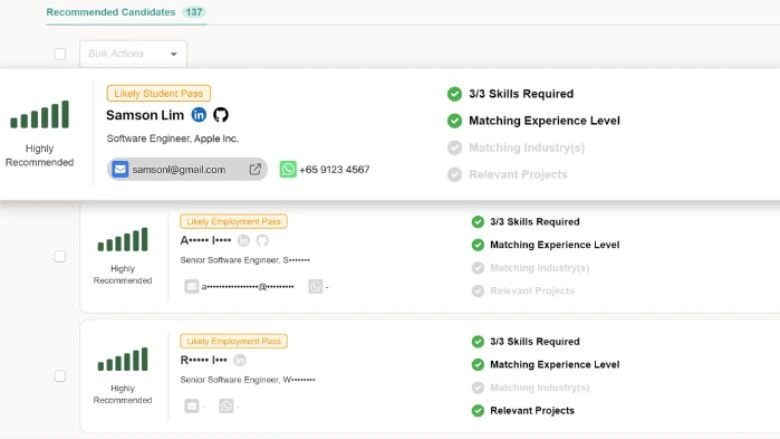9 Ways Technology Can Make Your Recruitment Process More Efficient

In recent years, the employee recruitment process has been made more effective and agile due to modern technology.
Technological developments such as talent acquisition technology (TA Tech) are transforming the way recruiters work.
The world of recruitment is now witnessing a paradigm shift from the traditional Applicant Tracking System (ATS) to the integration of more sophisticated algorithm-based Artificial Intelligence (AI) technology and the Internet of Things (IoT).
IoT is used in the hiring industry to collect, process, and automate data. IoT can control a network of objects remotely through AI, sensors, and software. Recruiters leverage these features to identify the best tech talents.
Let’s look at 9 of the most impactful technology that is shaping the future of recruitment:
1. New and Modern Talent Acquisition Technology (TA Tech) for Hiring Candidates
For years, most HR recruiters have used the Applicant Tracking System (ATS), a software used to track, organise, and filter candidates in the hiring and recruitment process.
There is still a lot of manual work involved as recruiters collect candidate data from multiple sources (through emails, phone calls and in-person recruitment events) and input this data by themselves, which can be time-consuming.
Besides the bottlenecks that come with data collection, HR executives spend more of their time gathering operational data, hampering the speed at which they can move candidates along the recruitment process.
Newer modern talent acquisition technologies will need automation to improve the recruiter's efficiency, productivity, remove selection bias, and overall, streamline the recruitment process further.
2. Ad Tech Improves Inbound Recruitment
Inbound recruitment attracts candidates through advertising and marketing job vacancies on different platforms besides job boards. Recruiters must know where potential candidates can be found for their advertisements to reach them. Ad tech uses algorithms and insights gained from a potential audience recruitment marketing automation can become more efficient.
As ad tech algorithms become more effective, recruiters will likely skip the hassle of using job boards. Instead, they will use AI technology to identify the best online platforms to post job ads that reach their target candidates directly, while controlling their advertising budget based on the size, scope, and features of their candidates.
3. AI-Sourcing Can Improve Relevancy of Candidates
One of the biggest frustrations recruiters faces is the lack of relevancy while searching through candidate databases. These searches return hundreds, if not thousands, of entries that often have no connection to open job roles apart from containing the same keywords.
Improvements in technology will change this very soon. For example, through its AI-enabled search engine, Scout can identify top tech talents in under 60 seconds. Scout’s AI engine finds talent matches based on over 1,000 parameters including social profiles and professional communities. This will significantly save time for hiring managers as they do not have to go through hundreds of random CVs to find the right candidate.

4. Integration of AI Chatbots Makes Screening Candidates Easier
Various global recruitment companies and HR teams have started introducing AI into their internal processes to complete many daily activities, which saves a lot of their time.
For example, AI chatbots like Mya are getting popular among recruiters because they help carry out daily HR-related tasks, including scheduling interviews and answering questions from candidates. Chatbots can also give candidates status updates on their applications and guide them toward more suitable job profiles.
Another example is Interviewer.ai, a leading AI-enabled software application for video interviews that screens candidates by analyzing intangible human qualities and behaviour, such as facial features, voice inflection, word choice, and more. This technology helps recruiters find ideal candidates by analyzing their candidates’ technical proficiency and emotional intelligence.
With recent studies having found that chatbots are able to save 75 percent of a recruiter's time, tools like this enable HR professionals to focus more on the communicative and emotional aspects of hiring such as interviewing candidates and negotiating contracts.
5. Technology Can Streamline Scheduling Candidate Interviews and Admin Tasks
The traditional recruitment process involves candidates submitting their applications to companies. However, this process is prone to human errors, like a resume going unnoticed during the manual screening stage.
The integration of IoT and active intelligence-based systems can select the profiles of ideal candidates and automatically schedule interviews with them.
Recruiters are using IoT to increase their hiring success rate by enhancing the recruitment experience for candidates, managing an extensive network of potential tech candidates, cutting down on time-intensive processes, and developing an intelligent database. IoT even automates the notification process by informing shortlisted candidates about their progression into the next rounds of interviews.
The system also informs rejected candidates about their application status to wrap up the recruitment process in a cordial manner, which can help to maintain good relations with candidates who may be considered for future opportunities.
6. Blockchain Technology Can Verify Education and Professional Certifications
The use of blockchain technology in the recruitment process has not become a part of the mainstream just yet. However, various organizations and experts have discussed that Blockchain has the potential to simplify the recruitment process even further.

By using blockchain, enterprises will be able to retrieve and store the data of verified candidates while complying with the highest standards of data privacy regulations. This can be particularly helpful for organisations with larger and more extensive databases containing sensitive candidate data and information. Blockchain could become a standard practice of HR recruitment, as long as there is industry-wide adoption.
7. Mobile-First Approach Can Speed Up Candidate Response
In this digital era, people use their cell phones for nearly all their daily activities, including searching and applying for jobs. With potential candidates looking for jobs on various job portals using their smartphones, this means that companies should optimise their career pages for mobile in order to attract as many interested candidates as possible and make the job application process easier for mobile users.
According to Statista, the mobile penetration in Singapore alone is 88.4 percent. This gives recruiters and talent teams even more incentive to optimize their employer profiles, job postings, and application process for mobile users. Companies will also need to make their websites and downloadable resources more mobile-friendly for this growing group of candidates.
8. Background Verification Technology Enforces Neutrality in the Screening Process
During the recruitment process, companies perform a thorough background check to verify the educational qualifications and work experience of candidates, as well as check for any criminal records. The time a company takes to complete a background check is critical because it affects how quickly the company can move candidates to the next phase of the hiring process.
Background verification technology can streamline the screening process further and ensure that candidates actually have the credential they say they have. Instead of requesting and sending documents back and forth between candidates and recruiters, or between employers and institutions, blockchain can remove these hurdles completely.
9. VR Metaverse Can Lead to Memorable Interactions and Experiences
The Metaverse is an alternate digital concept similar to virtual reality (VR) and is currently in experimental phase. However, industries like HR and recruitment will get immense benefits from it as it has the potential to improve the interaction between employers and candidates and create a more quality and memorable candidate experience.
Employers can also use the Metaverse for recruitment through virtual communication, which reduces costs and saves time in the screening process.

Although integrating the Metaverse will be expensive at the moment, the cost factor is likely to be reduced in the future once this technology becomes mainstream. Major tech companies, including Google, Meta (earlier Facebook), Microsoft, and Apple are investing a lot in Metaverse for better collaboration at work.
Final Thoughts
These technologies are helping recruiters to carry out the various aspects of the talent acquisition process more efficiently and seamlessly by eliminating manual activities. As a result, the performance and speed of the hiring process have improved significantly.
In this fast and transformative digital era with emerging technologies disrupting industries across the board, employers, organizations, talent teams and recruiters cannot miss the opportunity to capitalize on these new technologies in their recruitment processes.
Backend Technology Interview Questions
C Programming Language Interview Questions | PHP Interview Questions | .NET Core Interview Questions | NumPy Interview Questions | API Interview Questions | FastAPI Python Web Framework | Java Exception Handling Interview Questions | OOPs Interview Questions and Answers | Java Collections Interview Questions | System Design Interview Questions | Data Structure Concepts | Node.js Interview Questions | Django Interview Questions | React Interview Questions | Microservices Interview Questions | Key Backend Development Skills | Data Science Interview Questions | Python Interview Questions | Java Spring Framework Interview Questions | Spring Boot Interview Questions.
Frontend Technology Interview Questions
HTML Interview Questions | Angular Interview Questions | JavaScript Interview Questions | CSS Interview Questions.
Database Interview Questions
SQL Interview Questions | PostgreSQL Interview Questions | MongoDB Interview Questions | MySQL Interview Questions.
Cloud Interview Questions
AWS Lambda Interview Questions | Azure Interview Questions | Cloud Computing Interview Questions | AWS Interview Questions.
Quality Assurance Interview Questions
Moving from Manual Testing to Automated Testing | Selenium Interview Questions | Automation Testing Interview Questions.
DevOps and Cyber Security Interview Questions
DevOps Interview Questions | How to Prevent Cyber Security Attacks | Guide to Ethical Hacking | Network Security Interview Questions.
Design Product Interview Questions
Product Manager Interview Questions | UX Designer Interview Questions.
Interview Preparation Tips
Strength and Weakness Interview Questions | I Accepted a Job Offer But Got Another Interview | Preparation Tips For the Virtual Technical Interview | 7 Tips to Improve Your GitHub Profile to Land a Job | Software Engineer Career Opportunities in Singapore | What can you expect during a whiteboard interview | How To Write A Resignation Letter.
Quick Links
Practice Skills | Best Tech Recruitment Agency in Singapore, India | Graduate Hiring | HackerTrail Litmus | Scout - Sourcing Top Tech Talent in ONE Minute | About HackerTrail | Careers | Job Openings.





